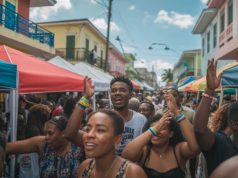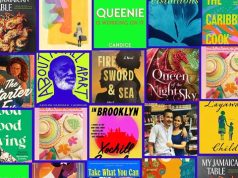
Stuart Kelly (The Scotsman) writes “Winner of the National Book Award for Fiction in America last month, this formally innovative novel from Justin Torres is melancholy, redemptive and transformative.”
One of Emily Dickinson’s best known poems begins: “One need not be a chamber – to be haunted – / One need not be a House – / The Brain – has Corridors surpassing / Material Place”. This could very well stand as an epigraph for Justin Torres’ debut novel (he is already the author of an excellent short story collection, We The Animals) which recently and rightly won the National Book Award for Fiction in America. In fact, its epigraph comes from Sex Variant Women In Literature, a 1956 text by Jeanette H Foster, although several lines are redacted in dark ink. This is the first of the blackings out in a novel which is by turns eerie, revelatory, frightening, anguished and sinister; yet the overwhelming emotional response I had on finishing it was how incredibly tender it was.
Blackouts is formally innovative. It is comparable to such works as S by JJ Abrams, Conquest by Nina Allan and Biography Of X by Catherine Lacey. These “novels” are anthologies of found texts, differing genres, artworks, doctored photographs and appropriated quotations, détourned into new meanings. The erasures in the text ultimately derive from A Humument by Tom Phillips, whose masterly work (in all six print iterations) involved art works covering – treating, as he wryly put it – an obscure and now obscured Victorian novel, A Human Document by WH Mallock. As with the cut-up technique of William Burroughs and Brion Gysin, these interventions against a pre-existing text hint at a buried, obscure or clandestine meaning that can be almost supernaturally revealed.
This is not an aesthetic parlour game but a matter of high seriousness. The plot of Blackouts is ironically straightforward. “Nene”, the anonymous Puerto Rican narrator, winds up at a place called The Palace where an elderly man, Juan Gay, whom he met when they were both in a psychiatric unit is dying. Both Juan and “Nene” are gay, and Juan has a copy of a two-volume book called Sex Variants: A Study Of Homosexual Patterns, which has been doctored (again, ironically) to turn the various diagnoses, reminiscences, scientific observations and memoirs into a kind of prose-poem. The unaltered book is genuine, written by the lesbian anthropologist Jan Gay in 1941, but published as if by a male medical doctor and significantly redacted and bowdlerised from the original field-work and case-notes. “Nene” is to complete the incomplete archive as he struggles to find the connection between Juan, Jan and Jan’s lover, the children’s author and illustrator Zhenya Gay. His care for Juan is not in administering drugs, but trading stories in the darkness.
It is, again, deliberately, ingeniously and provocatively ironic that the only way to tell this homosexual history is through the most flagrantly heterogenous of literary forms. Similarly, the only way to air these narratives is in a stifled, terminal space. It takes a novelist of rare skill and empathy to negotiate the different histories of gay literature, from the celebratory to the self-loathing, the outrageous to the poignant, and synthesis it into a whole where the experiences are both extraordinary and unremarkable. [. . .]
Sexuality is not the sole vector of the book. The pathologisation of it is mirrored in a phenomenon called “The Puerto Rican Syndrome”, a form of catalepsy and panic attack – a psychogical blackout. The Puerto Ricans are “increasingly visible” and this “attracts their gaze… the cops, the journalists, the doctors”. Although Juan admits that all forms of breakdown are subject to cultural codes, there is also the “colonizer syndrome”: imperialist, straight culture projects its anxieties onto a minority and then treats them as ill. Although as Juan puts it “people living under enormous pressure do sometimes break down, don’t they?” [. . .]
For full article, see https://www.msn.com/en-gb/news/other/book-review-blackouts-by-justin-torres/ar-AA1lqLGr and https://www.scotsman.com/arts-and-culture/books/book-review-blackouts-by-justin-torres-4443730
Stuart Kelly (The Scotsman) writes “Winner of the National Book Award for Fiction in America last month, this formally innovative novel from Justin Torres is melancholy, redemptive and transformative.” One of Emily Dickinson’s best known poems begins: “One need not be a chamber – to be haunted – / One need not be a House





